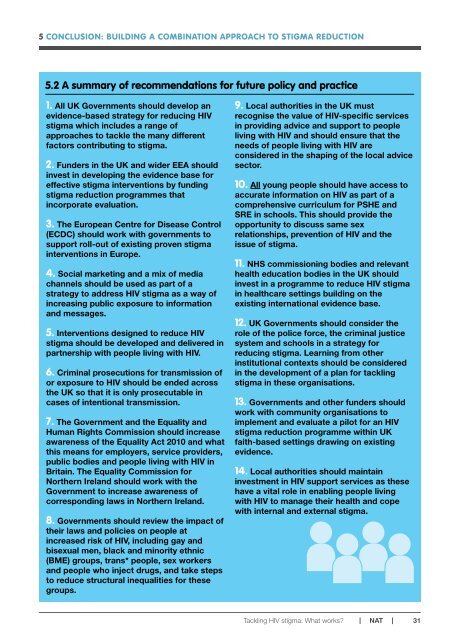Tackling HIV Stigma What works?
Jun_16_Tackling_HIV_Stigma
Jun_16_Tackling_HIV_Stigma
You also want an ePaper? Increase the reach of your titles
YUMPU automatically turns print PDFs into web optimized ePapers that Google loves.
5 CONCLUSION: BUILDING A COMBINATION APPROACH TO STIGMA REDUCTION<br />
5.2 A summary of recommendations for future policy and practice<br />
1. All UK Governments should develop an<br />
evidence-based strategy for reducing <strong>HIV</strong><br />
stigma which includes a range of<br />
approaches to tackle the many different<br />
factors contributing to stigma.<br />
2. Funders in the UK and wider EEA should<br />
invest in developing the evidence base for<br />
effective stigma interventions by funding<br />
stigma reduction programmes that<br />
incorporate evaluation.<br />
3. The European Centre for Disease Control<br />
(ECDC) should work with governments to<br />
support roll-out of existing proven stigma<br />
interventions in Europe.<br />
4. Social marketing and a mix of media<br />
channels should be used as part of a<br />
strategy to address <strong>HIV</strong> stigma as a way of<br />
increasing public exposure to information<br />
and messages.<br />
5. Interventions designed to reduce <strong>HIV</strong><br />
stigma should be developed and delivered in<br />
partnership with people living with <strong>HIV</strong>.<br />
6. Criminal prosecutions for transmission of<br />
or exposure to <strong>HIV</strong> should be ended across<br />
the UK so that it is only prosecutable in<br />
cases of intentional transmission.<br />
7. The Government and the Equality and<br />
Human Rights Commission should increase<br />
awareness of the Equality Act 2010 and what<br />
this means for employers, service providers,<br />
public bodies and people living with <strong>HIV</strong> in<br />
Britain. The Equality Commission for<br />
Northern Ireland should work with the<br />
Government to increase awareness of<br />
corresponding laws in Northern Ireland.<br />
8. Governments should review the impact of<br />
their laws and policies on people at<br />
increased risk of <strong>HIV</strong>, including gay and<br />
bisexual men, black and minority ethnic<br />
(BME) groups, trans* people, sex workers<br />
and people who inject drugs, and take steps<br />
to reduce structural inequalities for these<br />
groups.<br />
9. Local authorities in the UK must<br />
recognise the value of <strong>HIV</strong>-specific services<br />
in providing advice and support to people<br />
living with <strong>HIV</strong> and should ensure that the<br />
needs of people living with <strong>HIV</strong> are<br />
considered in the shaping of the local advice<br />
sector.<br />
10. All young people should have access to<br />
accurate information on <strong>HIV</strong> as part of a<br />
comprehensive curriculum for PSHE and<br />
SRE in schools. This should provide the<br />
opportunity to discuss same sex<br />
relationships, prevention of <strong>HIV</strong> and the<br />
issue of stigma.<br />
11. NHS commissioning bodies and relevant<br />
health education bodies in the UK should<br />
invest in a programme to reduce <strong>HIV</strong> stigma<br />
in healthcare settings building on the<br />
existing international evidence base.<br />
12. UK Governments should consider the<br />
role of the police force, the criminal justice<br />
system and schools in a strategy for<br />
reducing stigma. Learning from other<br />
institutional contexts should be considered<br />
in the development of a plan for tackling<br />
stigma in these organisations.<br />
13. Governments and other funders should<br />
work with community organisations to<br />
implement and evaluate a pilot for an <strong>HIV</strong><br />
stigma reduction programme within UK<br />
faith-based settings drawing on existing<br />
evidence.<br />
14. Local authorities should maintain<br />
investment in <strong>HIV</strong> support services as these<br />
have a vital role in enabling people living<br />
with <strong>HIV</strong> to manage their health and cope<br />
with internal and external stigma.<br />
<strong>Tackling</strong> <strong>HIV</strong> stigma: <strong>What</strong> <strong>works</strong>? NAT 31


